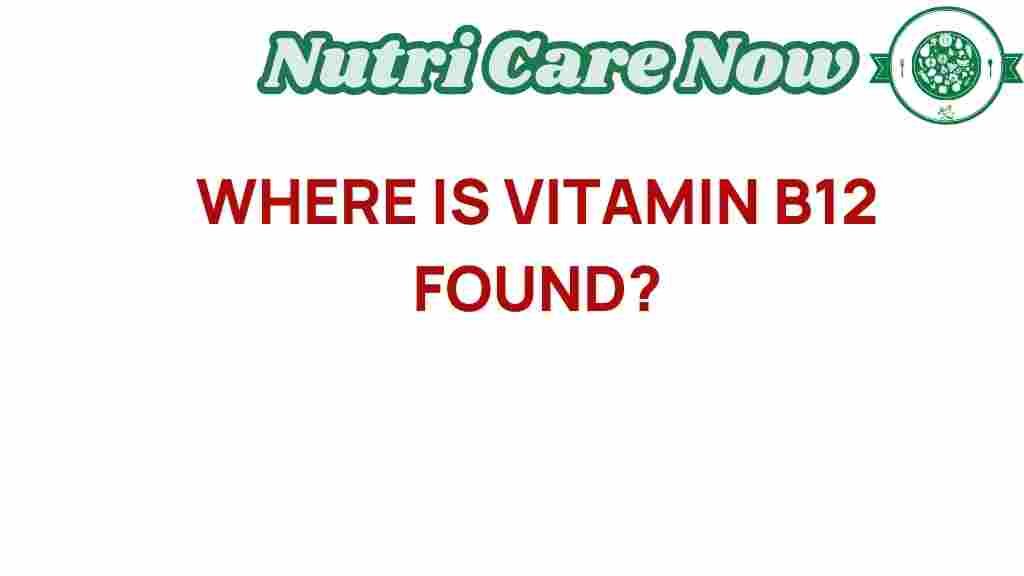Unearthing the Secrets of Vitamin B12: Where to Find This Vital Nutrient
Vitamin B12, also known as cobalamin, is a crucial nutrient that plays a significant role in our overall health and well-being. This essential vitamin is vital for the production of red blood cells, DNA synthesis, and the proper functioning of the nervous system. Despite its importance, many people do not consume enough Vitamin B12, leading to potential health issues. In this article, we will explore where to find this essential nutrient, its dietary needs, the consequences of deficiency, and how supplementation can help maintain optimal health.
The Importance of Vitamin B12 in Nutrition and Health
Vitamin B12 is unique among vitamins because it is primarily found in animal products. It is crucial for several bodily functions, including:
- Red Blood Cell Formation: Vitamin B12 is essential for the production of healthy red blood cells, which transport oxygen throughout the body.
- Nervous System Health: This vitamin helps maintain the myelin sheath that surrounds and protects nerves, ensuring proper nervous system function.
- DNA Synthesis: B12 plays a key role in the synthesis of DNA, which is vital for cell division and overall growth.
- Energy Production: It aids in the metabolism of fats and carbohydrates, helping convert food into energy.
Given these functions, ensuring adequate intake of Vitamin B12 is essential for maintaining good health. Let’s delve into the various food sources that can help meet our dietary needs.
Food Sources of Vitamin B12
Vitamin B12 is predominantly found in animal-based foods. Here are some of the best sources:
- Meat: Beef, liver, and chicken are excellent sources of Vitamin B12.
- Fish: Fish like salmon, trout, and tuna are rich in this vital nutrient.
- Dairy Products: Milk, yogurt, and cheese provide significant amounts of Vitamin B12.
- Eggs: Eggs, particularly the yolk, are a good source of Vitamin B12.
- Fortified Foods: Certain cereals and plant-based milks are fortified with Vitamin B12, making them suitable for vegans and vegetarians.
For those who follow a vegetarian or vegan diet, it’s essential to seek fortified foods or consider supplementation to meet dietary needs.
Understanding Dietary Needs for Vitamin B12
The recommended dietary allowance (RDA) for Vitamin B12 varies by age, gender, and life stage. Here’s a breakdown:
- Adults (aged 19-50): 2.4 micrograms per day
- Pregnant women: 2.6 micrograms per day
- Lactating women: 2.8 micrograms per day
Older adults and people with gastrointestinal issues may require higher amounts due to absorption challenges. Regular monitoring of Vitamin B12 levels is advisable for those at risk of deficiency.
Consequences of Vitamin B12 Deficiency
A deficiency in Vitamin B12 can lead to several health issues, including:
- Anemia: Insufficient B12 can result in megaloblastic anemia, characterized by large and dysfunctional red blood cells.
- Nerve Damage: A lack of B12 may lead to neuropathy, causing tingling, numbness, and balance issues.
- Cognitive Decline: Deficiency may contribute to memory problems and cognitive decline, particularly in older adults.
- Fatigue and Weakness: Low B12 levels can result in general fatigue and weakness due to impaired energy production.
Recognizing the signs and symptoms of Vitamin B12 deficiency is crucial for timely intervention.
Supplementation: A Practical Solution
If dietary intake of Vitamin B12 is insufficient, supplementation can be a practical solution. Here’s a step-by-step guide on how to approach supplementation:
Step 1: Consult a Healthcare Professional
Before starting any supplementation, it’s essential to consult with a healthcare provider to determine your specific needs and appropriate dosage.
Step 2: Choose the Right Form of Supplement
Vitamin B12 supplements are available in several forms, including:
- Cyanocobalamin: A common synthetic form of B12, often found in multivitamins.
- Methylcobalamin: A natural form of B12 that may be better absorbed and utilized by the body.
- Injection: In severe cases of deficiency, B12 injections may be necessary.
Step 3: Monitor Your Levels
Regular blood tests can help monitor your Vitamin B12 levels and ensure that supplementation is effective.
Troubleshooting Vitamin B12 Intake
If you’re still facing challenges with Vitamin B12 intake, consider these troubleshooting tips:
- Review Your Diet: Ensure you are including adequate B12-rich foods in your daily meals.
- Consider Fortified Options: Look for fortified cereals, nutritional yeast, and plant-based milks.
- Check for Absorption Issues: If you have gastrointestinal issues, consult your doctor as you may need higher doses or injections.
- Stay Informed: Keep up with the latest research on Vitamin B12 and its health implications.
Taking proactive steps to address any deficiencies can lead to significant improvements in your overall wellness.
Conclusion
Vitamin B12 is an essential nutrient that plays a critical role in maintaining health and wellness. Understanding where to find this vital nutrient, knowing your dietary needs, recognizing deficiency symptoms, and exploring supplementation options can help you optimize your health. Whether through dietary sources or supplements, ensuring adequate Vitamin B12 intake is crucial for everyone, especially vegetarians, vegans, and older adults.
For more information on nutrition and dietary needs, check out this comprehensive guide on vitamins. If you suspect a deficiency or have specific health concerns, always consult a healthcare professional.
Embrace the journey to better health by prioritizing your Vitamin B12 intake, and enjoy the benefits of enhanced energy, cognitive function, and overall well-being!
This article is in the category Health and created by NutriCareNow Team
